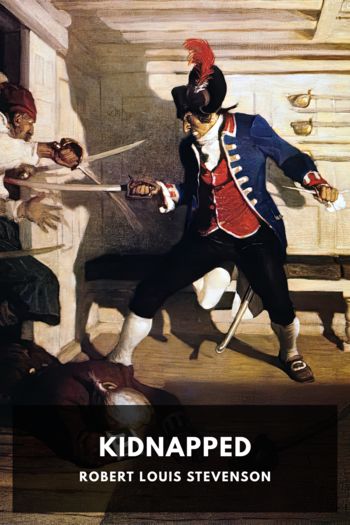Catriona, Robert Louis Stevenson [the gingerbread man read aloud txt] 📗

- Author: Robert Louis Stevenson
Book online «Catriona, Robert Louis Stevenson [the gingerbread man read aloud txt] 📗». Author Robert Louis Stevenson
Through all this Mr. Miller sat quiet. He was a slip of an oldish gentleman, ruddy and twinkling; he spoke in a smooth rich voice, with an infinite effect of pawkiness, dealing out each word the way an actor does, to give the most expression possible; and even now, when he was silent, and sat there with his wig laid aside, his glass in both hands, his mouth funnily pursed, and his chin out, he seemed the mere picture of a merry slyness. It was plain he had a word to say, and waited for the fit occasion.
It came presently. Colstoun had wound up one of his speeches with some expression of their duty to their client. His brother sheriff was pleased, I suppose, with the transition. He took the table in his confidence with a gesture and a look.
“That suggests to me a consideration which seems overlooked,” said he. “The interest of our client goes certainly before all, but the world does not come to an end with James Stewart.” Whereat he cocked his eye. “I might condescend, exempli gratia, upon a Mr. George Brown, a Mr. Thomas Miller, and a Mr. David Balfour. Mr. David Balfour has a very good ground of complaint, and I think, gentlemen—if his story was properly red out—I think there would be a number of wigs on the green.”
The whole table turned to him with a common movement.
“Properly handled and carefully red out, his is a story that could scarcely fail to have some consequence,” he continued. “The whole administration of justice, from its highest officer downward, would be totally discredited; and it looks to me as if they would need to be replaced.” He seemed to shine with cunning as he said it. “And I need not point out to ye that this of Mr. Balfour’s would be a remarkable bonny cause to appear in,” he added.
Well, there they all were started on another hare; Mr. Balfour’s cause, and what kind of speeches could be there delivered, and what officials could be thus turned out, and who would succeed to their positions. I shall give but the two specimens. It was proposed to approach Symon Fraser, whose testimony, if it could be obtained, could prove certainly fatal to Argyle and Prestongrange. Miller highly approved of the attempt. “We have here before us a dreeping roast,” said he, “here is cut-and-come-again for all.” And methought all licked their lips. The other was already near the end. Stewart the Writer was out of the body with, delight, smelling vengeance on his chief enemy, the Duke.
“Gentlemen,” cried he, charging his glass, “here is to Sheriff Miller. His legal abilities are known to all. His culinary, this bowl in front of us is here to speak for. But when it comes to the poleetical!”—cries he, and drains the glass.
“Ay, but it will hardly prove politics in your meaning, my friend,” said the gratified Miller. “A revolution, if you like, and I think I can promise you that historical writers shall date from Mr. Balfour’s cause. But properly guided, Mr. Stewart, tenderly guided, it shall prove a peaceful revolution.”
“And if the damned Campbells get their ears rubbed, what care I?” cries Stewart, smiting down his fist.
It will be thought I was not very well pleased with all this, though I could scarce forbear smiling at a kind of innocency in these old intriguers. But it was not my view to have undergone so many sorrows for the advancement of Sheriff Miller or to make a revolution in the Parliament House: and I interposed accordingly with as much simplicity of manner as I could assume.
“I have to thank you, gentlemen, for your advice,” said I. “And now I would like, by your leave, to set you two or three questions. There is one thing that has fallen rather on one side, for instance: Will this cause do any good to our friend James of the Glens?”
They seemed all a hair set back, and gave various answers, but concurring practically in one point, that James had now no hope but in the King’s mercy.
“To proceed, then,” said I, “will it do any good to Scotland? We have a saying that it is an ill bird that fouls his own nest. I remember hearing we had a riot in Edinburgh when I was an infant child, which gave occasion to the late Queen to call this country barbarous; and I always understood that we had rather lost than gained by that. Then came the year ’Forty-five, which made Scotland to be talked of everywhere; but I never heard it said we had anyway gained by the ’Forty-five. And now we come to this cause of Mr. Balfour’s, as you call it. Sheriff Miller tells us historical writers are to date from it, and I would not wonder. It is only my fear they would date from it as a period of calamity and public reproach.”
The nimble-witted Miller had already smelt where I was travelling to, and made haste to get on the same road. “Forcibly put, Mr. Balfour,” says he. “A weighty observe, sir.”
“We have next to ask ourselves if it will be good for King George,” I pursued. “Sheriff Miller appears pretty easy upon this; but I doubt you will scarce be able to pull down the house from under him, without his Majesty coming by a knock or two, one of which might easily prove fatal.”
I gave them a chance to answer, but none volunteered.
“Of those for whom the case was to be profitable,” I went on, “Sheriff Miller gave us the names of





Comments (0)